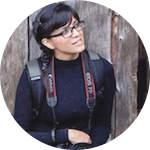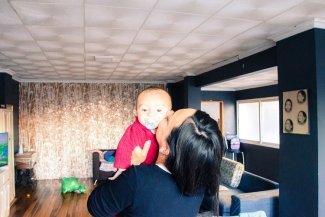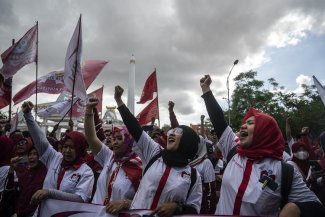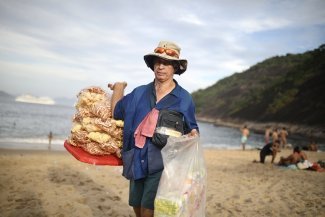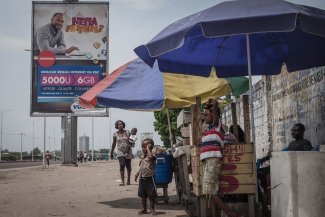Every day an average of 830 women worldwide die from preventable causes related to pregnancy and childbirth, according to the World Health Organisation. The high rate of maternal deaths in some areas of the world reflects the inequalities in access to health services and underlines the differences between rich and poor.
Almost all maternal deaths, some 99%, take place in developing countries. And in half of those cases, the maternal deaths occur in difficult surroundings and against a background of humanitarian crisis.
According to Mexico’s National Institute of Statistics and Geography (INEGI), the country’s Guerrero State has the worst recorded level of maternal mortality, at 91 deaths for every 100,000 live births.
The organisation Kinal Antzetik Guerrero (The Land of Women, in the Mayan language Tzeltal), made up of women working for women, is active in the municipalities of Ometepec and Cochoapa el Grande, both in Guerrero.
Hermelinda Tiburcio, from the indigenous Mixtec people, and the organisation’s legal representative, visits the most deprived regions in the State to give women – mostly indigenous – information. The aim is to eradicate maternal mortality and put an end to obstetric violence (by health centres), both a result of disinformation and women’s lack of knowledge about their rights.

Kinal Antzetik Guerrero, a network of midwives and community organisers, arranges visits and workshops for women in the area. They tackle issues such as gender violence, the importance of a woman taking charge of her own body, and of realising that nobody else can take decisions for her. The organisation visits and supports over 600 women a year in the La Montaña y Costa Chica regions (both in Guerrero).
Kinal Antzetik Guerrero, a network of midwives and community organisers, arranges visits and workshops for women in the area. They tackle issues such as gender violence, the importance of a woman taking charge of her own body, and of realising that nobody else can take decisions for her.
The organisation visits and supports over 600 women a year in the La Montaña y Costa Chica regions (both in Guerrero). Most of the expectant mothers prefer to have their births overseen by midwives, but if a pregnancy presents risks, the women are referred to the health services.

Ancelma Santiago, an Amuzga midwife, provides care and support for the women before, during and after childbirth. At the same time she teaches midwifery to other women so that the skill is not lost and can be passed on to future generations.
Ancelma Santiago, an Amuzga midwife, provides care and support for the women before, during and after childbirth. At the same time she teaches midwifery to other women so that the skill is not lost and can be passed on to future generations.

Hermelinda Tiburcio runs gender workshops on sexual and reproductive health, obstetric and gender violence, workshops focused on the principle that it is the woman who decides how many children she shall have rather than the decision resulting from pressure imposed by the health services or the community, and on ensuring that they have contraception to hand and know about contraceptive methods.
Hermelinda Tiburcio runs gender workshops on sexual and reproductive health, obstetric and gender violence, workshops focused on the principle that it is the woman who decides how many children she shall have rather than the decision resulting from pressure imposed by the health services or the community, and on ensuring that they have contraception to hand and know about contraceptive methods.
“We can have children if we want to, but it is important to have them further apart when we decide we want another. That will also ensure we have time to do other things, and to be more prepared” explains Hermelinda.

Kinal Antzetik Guerrero also works to develop a “culture of good treatment” to avoid violence within families. Husbands, wives and children are invited to attend the workshops so that everyone can become aware that a woman is not an object; that it is neither normal nor right at a woman be raped by a man.
Kinal Antzetik Guerrero also works to develop a “culture of good treatment” to avoid violence within families. Husbands, wives and children are invited to attend the workshops so that everyone can become aware that a woman is not an object; that it is neither normal nor right at a woman be raped by a man.

The organisation believes it is essential for women to have access to new technology – to receive information and services – which is why it trains them in new technologies and makes computer classes available to them. They also have legal support about their rights and to help them with complaints in their own language, Amuzgo or Mixteco – with translation into Spanish.
The organisation believes it is essential for women to have access to new technology – to receive information and services – which is why it trains them in new technologies and makes computer classes available to them. They also have legal support about their rights and to help them with complaints in their own language, Amuzgo or Mixteco – with translation into Spanish.

Kinal Antzetik Guerrero seeks to ensure that women recognise and take ownership of their own bodies, and know that they can decide, think, and act for themselves. In this way they will know how to identify and report ill-treatment, negligence, or the insertion of inter-uterine devices without their consent.
Kinal Antzetik Guerrero seeks to ensure that women recognise and take ownership of their own bodies, and know that they can decide, think, and act for themselves. In this way they will know how to identify and report ill-treatment, negligence, or the insertion of inter-uterine devices without their consent.

“I am aware that every day there is the possibility that I might die, but I have decided to continue dreaming the same dream as many of my indigenous sisters who hope for a better Mexico, where government institutions use public resources transparently, where the institutions of justice are fair and impartial, and who are dedicating their lives to their children and to the future generation.
“I am aware that every day there is the possibility that I might die, but I have decided to continue dreaming the same dream as many of my indigenous sisters who hope for a better Mexico, where government institutions use public resources transparently, where the institutions of justice are fair and impartial, and who are dedicating their lives to their children and to the future generation. To abandon the struggle would be to abandon my dream. What would be the point of my escaping from poverty, marginalisation, ignorance and machismo if I, as a woman, were to ignore what is happening in my country,” says Hermelinda, who has suffered threats for the work she does to defend the rights of the women in her community.



